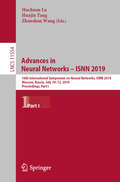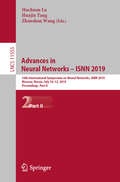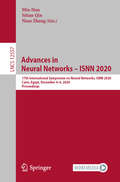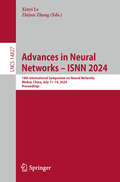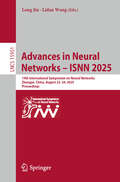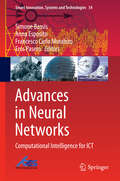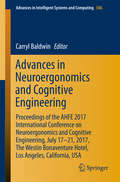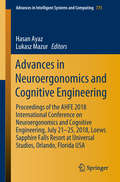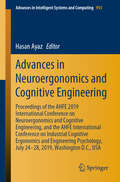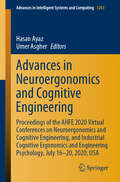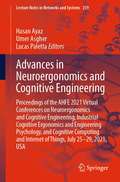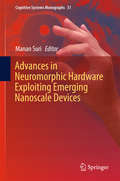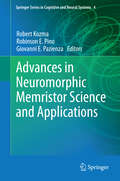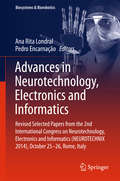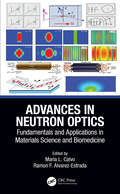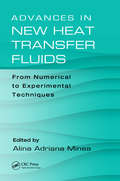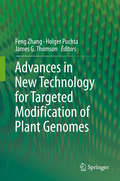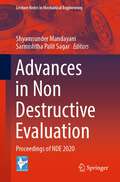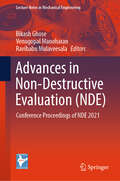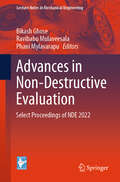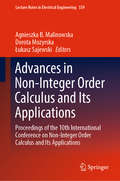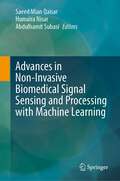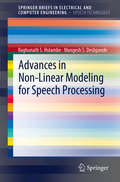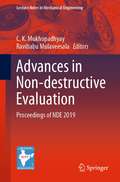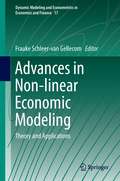- Table View
- List View
Advances in Neural Networks – ISNN 2019: 16th International Symposium on Neural Networks, ISNN 2019, Moscow, Russia, July 10–12, 2019, Proceedings, Part I (Lecture Notes in Computer Science #11554)
by Zhanshan Wang Huajin Tang Huchuan LuThis two-volume set LNCS 11554 and 11555 constitutes the refereed proceedings of the 16th International Symposium on Neural Networks, ISNN 2019, held in Moscow, Russia, in July 2019. The 111 papers presented in the two volumes were carefully reviewed and selected from numerous submissions. The papers were organized in topical sections named: Learning System, Graph Model, and Adversarial Learning; Time Series Analysis, Dynamic Prediction, and Uncertain Estimation; Model Optimization, Bayesian Learning, and Clustering; Game Theory, Stability Analysis, and Control Method; Signal Processing, Industrial Application, and Data Generation; Image Recognition, Scene Understanding, and Video Analysis; Bio-signal, Biomedical Engineering, and Hardware.
Advances in Neural Networks – ISNN 2019: 16th International Symposium on Neural Networks, ISNN 2019, Moscow, Russia, July 10–12, 2019, Proceedings, Part II (Lecture Notes in Computer Science #11555)
by Zhanshan Wang Huajin Tang Huchuan LuThis two-volume set LNCS 11554 and 11555 constitutes the refereed proceedings of the 16th International Symposium on Neural Networks, ISNN 2019, held in Moscow, Russia, in July 2019. The 111 papers presented in the two volumes were carefully reviewed and selected from numerous submissions. The papers were organized in topical sections named: Learning System, Graph Model, and Adversarial Learning; Time Series Analysis, Dynamic Prediction, and Uncertain Estimation; Model Optimization, Bayesian Learning, and Clustering; Game Theory, Stability Analysis, and Control Method; Signal Processing, Industrial Application, and Data Generation; Image Recognition, Scene Understanding, and Video Analysis; Bio-signal, Biomedical Engineering, and Hardware.
Advances in Neural Networks – ISNN 2020: 17th International Symposium on Neural Networks, ISNN 2020, Cairo, Egypt, December 4–6, 2020, Proceedings (Lecture Notes in Computer Science #12557)
by Min Han Sitian Qin Nian ZhangThis volume LNCS 12557 constitutes the refereed proceedings of the 17th International Symposium on Neural Networks, ISNN 2020, held in Cairo, Egypt, in December 2020.The 24 papers presented in the two volumes were carefully reviewed and selected from 39 submissions. The papers were organized in topical sections named: optimization algorithms; neurodynamics, complex systems, and chaos; supervised/unsupervised/reinforcement learning/deep learning; models, methods and algorithms; and signal, image and video processing.
Advances in Neural Networks – ISNN 2024: 18th International Symposium on Neural Networks, Weihai, China, July 11–14, 2024, Proceedings (Lecture Notes in Computer Science #14827)
by Zhijun Zhang Xinyi LeThis volume constitutes the refereed proceedings of the 18th International Symposium on Neural Networks, ISNN 2024, held in Weihai, China, during 11-14, July 2024. The 59 full papers were carefully reviewed and selected from 82 submission. They are categorized in the following sections: Optimization Algorithms; Adversarial Learning, Transfer Learning, and Deep Learning; Signal, Image, and Video Processing; Modeling, Analysis, and Implementation of Neural Networks; Control Systems, Robotics, and Autonomous Driving; Fault Diagnosis and Intelligent Industry & Bio-signal, Bioinformatics, and Biomedical Engineering.
Advances in Neural Networks – ISNN 2025: 19th International Symposium on Neural Networks, Zhangye, China, August 22–24, 2025, Proceedings (Lecture Notes in Computer Science #15951)
by Long Jin Lidan WangThis volume constitutes the refereed proceedings of the 19th International Symposium on Neural Networks, ISNN 2025, held in Zhangye, China, during August 22–24, 2025. The 52 full papers were carefully reviewed and selected from 60 submission. They were organized in topical sections as follows: Design, Modeling and Application of AI Algorithms; Signal, Image, and Video Processing; Modeling, Analysis, and Implementation of Neural Networks; Control Systems, Robotics, and Autonomous Driving; Machine Learning Methods and Applications.
Advances in Neural Networks: Computational Intelligence for ICT (Smart Innovation, Systems and Technologies #54)
by Anna Esposito Francesco Carlo Morabito Simone Bassis Eros PaseroThis carefullyedited book is putting emphasis on computational and artificial intelligentmethods for learning and their relative applications in robotics, embeddedsystems, and ICT interfaces for psychological and neurological diseases. Thebook is a follow-up of the scientific workshop on Neural Networks (WIRN 2015)held in Vietri sul Mare, Italy, from the 20th to the 22nd of May 2015. Theworkshop, at its 27th edition became a traditional scientific event thatbrought together scientists from many countries, and several scientificdisciplines. Each chapter is an extended version of the original contributionpresented at the workshop, and together with the reviewers' peer revisions italso benefits from the live discussion during the presentation. The content of book is organized in the following sections. 1. Introduction, 2. Machine Learning, 3. Artificial Neural Networks: Algorithms and models, 4. Intelligent Cyberphysical and Embedded System, 5. Computational Intelligence Methods for Biomedical ICT in NeurologicalDiseases, 6. Neural Networks-Based Approaches to Industrial Processes, 7. Reconfigurable Modular Adaptive Smart Robotic Systems forOptoelectronics Industry: The White'R Instantiation This book is unique in proposing a holistic and multidisciplinaryapproach to implement autonomous, and complex Human Computer Interfaces.
Advances in Neuroergonomics and Cognitive Engineering: Proceedings of the AHFE 2017 International Conference on Neuroergonomics and Cognitive Engineering, July 17–21, 2017, The Westin Bonaventure Hotel, Los Angeles, California, USA (Advances in Intelligent Systems and Computing #586)
by Carryl BaldwinThis book offers a broad perspective on the field of cognitive engineering and neuroergonomics, covering emerging practices and future trends toward the harmonious integration of human operators with computational systems. It reports on novel theoretical findings on mental workload and stress, activity theory, human reliability, error and risk, and neuroergonomic measures alike, together with a wealth of cutting-edge applications. Further, the book describes key advances in our understanding of cognitive processes, including mechanisms of perception, memory, reasoning, and motor response, with a special emphasis on their role in interactions between humans and other elements of computer-based systems. Based on the AHFE's main track on Neuroergonomics and Cognitive Engineering, held on July 17-21, 2017 in Los Angeles, California, USA, it provides readers with a comprehensive overview of the current challenges in cognitive computing and factors influencing human performance.
Advances in Neuroergonomics and Cognitive Engineering: Proceedings of the AHFE 2018 International Conference on Neuroergonomics and Cognitive Engineering, July 21–25, 2018, Loews Sapphire Falls Resort at Universal Studios, Orlando, Florida USA (Advances in Intelligent Systems and Computing #775)
by Hasan Ayaz Lukasz MazurThis book offers a broad perspective on the field of cognitive engineering and neuroergonomics, covering emerging practices and future trends toward the harmonious integration of human operators and computer systems. It presents novel theoretical findings on mental workload and stress, activity theory, human reliability, error and risk, and neuroergonomic measures alike, together with a wealth of cutting-edge applications. Further, the book describes key advances in our understanding of cognitive processes, including mechanisms of perception, memory, reasoning, and motor response, with a special emphasis on their role in interactions between humans and other elements of computer-based systems. Based on the AHFE 2018 affiliated conference on Neuroergonomics and Cognitive Engineering, held on July 21–25, 2018, in Orlando, Florida, USA, it provides readers with a comprehensive overview of the current challenges in cognitive computing and factors influencing human performance.
Advances in Neuroergonomics and Cognitive Engineering: Proceedings of the AHFE 2019 International Conference on Neuroergonomics and Cognitive Engineering, and the AHFE International Conference on Industrial Cognitive Ergonomics and Engineering Psychology, July 24-28, 2019, Washington D.C., USA (Advances in Intelligent Systems and Computing #953)
by Hasan AyazThis book offers a broad perspective on the field of cognitive engineering and neuroergonomics, covering emerging practices and future trends toward the harmonious integration of human operators and computer systems. It presents novel theoretical findings on mental workload and stress, activity theory, human reliability, error and risk, and neuroergonomic measures alike, together with a wealth of cutting-edge applications. Further, the book describes key advances in our understanding of cognitive processes, including mechanisms of perception, memory, reasoning, and motor response, with a special emphasis on their role in interactions between humans and other elements of computer-based systems. Based on the AHFE 2019 affiliated conference on Neuroergonomics and Cognitive Engineering, held on July 24-28, 2019, in Washington D.C., USA, it provides readers with a comprehensive overview of the current challenges in cognitive computing and factors influencing human performance.
Advances in Neuroergonomics and Cognitive Engineering: Proceedings of the AHFE 2020 Virtual Conferences on Neuroergonomics and Cognitive Engineering, and Industrial Cognitive Ergonomics and Engineering Psychology, July 16-20, 2020, USA (Advances in Intelligent Systems and Computing #1201)
by Hasan Ayaz Umer AsgherThis book offers broad overview of the field of cognitive engineering and neuroergonomics, covering emerging practices and future trends toward the harmonious integration of human operators and computer systems. It presents novel theoretical findings on mental workload and stress, activity theory, human reliability, error and risk, and a wealth of cutting-edge applications, such as strategies to make assistive technologies more user-oriented. Further, the book describes key advances in our understanding of cognitive processes, including mechanisms of perception, memory, reasoning, and motor response, with a particular focus on their role in interactions between humans and other elements of computer-based systems. Gathering the proceedings of the AHFE 2020 Virtual Conferences on Neuroergonomics and Cognitive Engineering, and Industrial Cognitive Ergonomics and Engineering Psychology, held on 16–20 July 2020, this book provides extensive and timely information for human–computer interaction researchers, human factors engineers and interaction designers, as well as decision-makers.
Advances in Neuroergonomics and Cognitive Engineering: Proceedings of the AHFE 2021 Virtual Conferences on Neuroergonomics and Cognitive Engineering, Industrial Cognitive Ergonomics and Engineering Psychology, and Cognitive Computing and Internet of Things, July 25-29, 2021, USA (Lecture Notes in Networks and Systems #259)
by Hasan Ayaz Umer Asgher Lucas PalettaThis book offers a broad overview of the field of cognitive engineering and neuroergonomics, covering emerging practices and future trends toward the harmonious integration of human operators and computational systems. It gathers both theoretical and practice-oriented studies on mental workload and stress, activity theory, human reliability, error and risk. It covers applications in various field, and corresponding strategies to make assistive technologies more user-oriented. Further, the book describes key advances in our understanding of cognitive processes, including mechanisms of perception, memory, reasoning, and motor response, with a particular focus on their role in interactions between humans and other elements of computer-based systems. Gathering the proceedings of the AHFE 2021 Conferences on Neuroergonomics and Cognitive Engineering, Industrial Cognitive Ergonomics and Engineering Psychology, and Cognitive Computing and Internet of Things, held virtually on July 25-29, 2021, from USA, this book offers extensive information and a thought-provoking guide for researchers and practitioners in cognitive engineering, neuroergonomics and their applications.
Advances in Neuromorphic Hardware Exploiting Emerging Nanoscale Devices (Cognitive Systems Monographs #31)
by Manan SuriThis book covers all major aspects of cutting-edge research in the field of neuromorphic hardware engineering involving emerging nanoscale devices. Special emphasis is given to leading works in hybrid low-power CMOS-Nanodevice design. The book offers readers a bidirectional (top-down and bottom-up) perspective on designing efficient bio-inspired hardware. At the nanodevice level, it focuses on various flavors of emerging resistive memory (RRAM) technology. At the algorithm level, it addresses optimized implementations of supervised and stochastic learning paradigms such as: spike-time-dependent plasticity (STDP), long-term potentiation (LTP), long-term depression (LTD), extreme learning machines (ELM) and early adoptions of restricted Boltzmann machines (RBM) to name a few. The contributions discuss system-level power/energy/parasitic trade-offs, and complex real-world applications. The book is suited for both advanced researchers and students interested in the field.
Advances in Neuromorphic Memristor Science and Applications (Springer Series in Cognitive and Neural Systems #4)
by Robinson E. Pino Robert Kozma Giovanni E. PazienzaPhysical implementation of the memristor at industrial scale sparked the interest from various disciplines, ranging from physics, nanotechnology, electrical engineering, neuroscience, to intelligent robotics. As any promising new technology, it has raised hopes and questions; it is an extremely challenging task to live up to the high expectations and to devise revolutionary and feasible future applications for memristive devices. The possibility of gathering prominent scientists in the heart of the Silicon Valley given by the 2011 International Joint Conference on Neural Networks held in San Jose, CA, has offered us the unique opportunity of organizing a series of special events on the present status and future perspectives in neuromorphic memristor science. This book presents a selection of the remarkable contributions given by the leaders of the field and it may serve as inspiration and future reference to all researchers that want to explore the extraordinary possibilities given by this revolutionary concept.
Advances in Neurotechnology, Electronics and Informatics: Revised Selected Papers from the 2nd International Congress on Neurotechnology, Electronics and Informatics (NEUROTECHNIX 2014), October 25-26, Rome, Italy (Biosystems & Biorobotics #12)
by Ana Rita Londral Pedro EncarnaçãoThis book is a timely report on current neurotechnology research. It presents a snapshot of the state of the art in the field, discusses current challenges and identifies new directions. The book includes a selection of extended and revised contributions presented at the 2nd International Congress on Neurotechnology, Electronics and Informatics (NEUROTECHNIX 2014), held October 25-26 in Rome, Italy. The chapters are varied: some report on novel theoretical methods for studying neuronal connectivity or neural system behaviour; others report on advanced technologies developed for similar purposes; while further contributions concern new engineering methods and technological tools supporting medical diagnosis and neurorehabilitation. All in all, this book provides graduate students, researchers and practitioners dealing with different aspects of neurotechnologies with a unified view of the field, thus fostering new ideas and research collaborations among groups from different disciplines.
Advances in Neutron Optics: Fundamentals and Applications in Materials Science and Biomedicine (Multidisciplinary and Applied Optics)
by Maria L. Calvo Ramon F. Alvarez-EstradaNeutron optics studies the interactions of a beam of slow neutrons with matter. This book updates various advances on neutron optics. There will be a focus on the very active topics of neutron imaging (NI) and neutron spin optics (NSO). The book will also present applications of neutron beams in biomedicine, such as Boron Neutron Capture Therapy (BNCT) and related techniques. Features: Discusses diffraction and interference of slow neutrons, including computational approaches Reviews neutron imaging (NI) and neutron spin optics (NSO) Treats two major sources of slow neutron beams: (1) fission reactions at nuclear reactors and (2) collisions in particle accelerators (small ones, spallation sources) of charged particle beams with targets of heavy atoms Selects subjects on fundamental quantum aspects of slow neutrons and on confined propagation and waveguiding thereof Updates slow neutron beams and BNCT
Advances in New Heat Transfer Fluids: From Numerical to Experimental Techniques (Heat Transfer)
by Alina Adriana MineaHeat transfer enhancement has seen rapid development and widespread use in both conventional and emerging technologies. Improvement of heat transfer fluids requires a balance between experimental and numerical work in nanofluids and new refrigerants. Recognizing the uncertainties in development of new heat transfer fluids, Advances in New Heat Transfer Fluids: From Numerical to Experimental Techniques contains both theoretical and practical coverage.
Advances in New Technology for Targeted Modification of Plant Genomes
by Feng Zhang James G. Thomson Holger PuchtaOver the past 50 years, biotechnology has been the major driving force for increasing crop productivity. Particularly, advances in plant genetic engineering technologies have opened up vast new opportunities for plant researchers and breeders to create new crop varieties with desirable traits. Recent development of precise genome modification methods, such as targeted gene knock-out/knock-in and precise gene replacement, moves genetic engineering to another level and offers even more potentials for improving crop production. The work provides an overview of the latest advances on precise genomic engineering technologies in plants. Topics include recombinase and engineered nucleases-mediated targeted modification, negative/positive selection-based homologous recombination and oligo nucleotide-mediated recombination. Finally, challenges and impacts of the new technologies on present regulations for genetic modification organisms (GMOs) will be discussed.
Advances in Non Destructive Evaluation: Proceedings of NDE 2020 (Lecture Notes in Mechanical Engineering)
by Shyamsunder Mandayam Sarmishtha Palit SagarThis book comprises the proceedings of the Conference and Exhibition on Non Destructive Evaluation (NDE 2020). The contents of the volume encompass a vast spectrum from Conventional to Advanced NDE including novel methods, instrumentation, sensors, procedures, and data analytics as applied to all industry segments for quality control, periodic maintenance, life estimation, structural integrity and related areas. This book will be a useful reference for students, researchers and practitioners.
Advances in Non-Destructive Evaluation: Conference Proceedings of NDE 2021 (Lecture Notes in Mechanical Engineering)
by Ravibabu Mulaveesala Bikash Ghose Venugopal ManoharanThis book comprises the proceedings of the Conference and Exhibition on Non-Destructive Evaluation (NDE 2021) organised by the Indian Society for Non-destructive Testing (ISNT). This book covers topics from wide domains from conventional to advanced NDE, including conventional and advanced NDE methods, drone-based inspections, thermal wave imaging, NDT data fusion, material characterization, waveguide sensors, inspections of civil structures, medical applications such as bone density and cancer diagnosis, periodic maintenance, life estimation, as well as structural integrity and related areas. This book serves as a useful reference for students, researchers, and practitioners alike.
Advances in Non-Destructive Evaluation: Select Proceedings of NDE 2022 (Lecture Notes in Mechanical Engineering)
by Ravibabu Mulaveesala Bikash Ghose Phani MylavarapuThis book comprises the proceedings of the Conference and Exhibition on Non-Destructive Evaluation (NDE 2022). The contents of the volume encompass a vast spectrum from conventional to advanced NDE including novel methods, and emerging NDE technologies. It covers topics from wide domains from conventional to advanced NDE methods which includes but not limited to drone-based inspections, thermal wave imaging, microwave NDE, shearography, Quantitative NDE using Digital Image Correlation, modeling and simulation, NDT data fusion, material characterization, waveguide sensors, inspections of civil structures, medical applications such as bone density and cancer diagnosis, signal and image processing, NDE sensors, instrumentation, software and systems, NDE 4.0 and robotics, automation, AI in NDE, functional and operational testing, NDE data analytics, reliability and safety assurance, periodic maintenance, life estimation, as well as structural integrity and related areas. This book serves as a useful reference for students, researchers, and practitioners working in the areas of non-destructive testing and evaluation.
Advances in Non-Integer Order Calculus and Its Applications: Proceedings Of The 10th International Conference On Non-integer Order Calculus And Its Applications (Lecture Notes in Electrical Engineering #559)
by Agnieszka B. Malinowska Dorota Mozyrska Łukasz SajewskiThis book provides an overview of some recent findings in the theory and applications of non-integer order systems. Discussing topics ranging from the mathematical foundations to technical applications of continuous-time and discrete-time fractional calculus, it includes 22 original research papers and is subdivided into four parts: <P><P> • Mathematical Foundations <P><P> • Approximation, Modeling and Simulations <P><P> • Fractional Systems Analysis and Control <P><P> • Applications <P><P> The papers were selected from those presented at the 10th International Conference of Non-integer Order Calculus and its Applications, which was held at the Bialystok University of Technology, Poland, September 20–21, 2018. <P><P> Thanks to the broad spectrum of topics covered, the book is suitable for researchers from applied mathematics and engineering. It is also a valuable resource for graduate students, as well as for scholars looking for new mathematical tools.
Advances in Non-Invasive Biomedical Signal Sensing and Processing with Machine Learning
by Abdulhamit Subasi Saeed Mian Qaisar Humaira NisarThis book presents the modern technological advancements and revolutions in the biomedical sector. Progress in the contemporary sensing, Internet of Things (IoT) and machine learning algorithms and architectures have introduced new approaches in the mobile healthcare. A continuous observation of patients with critical health situation is required. It allows monitoring of their health status during daily life activities such as during sports, walking and sleeping. It is realizable by intelligently hybridizing the modern IoT framework, wireless biomedical implants and cloud computing. Such solutions are currently under development and in testing phases by healthcare and governmental institutions, research laboratories and biomedical companies. The biomedical signals such as electrocardiogram (ECG), electroencephalogram (EEG), Electromyography (EMG), phonocardiogram (PCG), Chronic Obstructive Pulmonary (COP), Electrooculography (EoG), photoplethysmography (PPG), and image modalities such as positron emission tomography (PET), magnetic resonance imaging (MRI) and computerized tomography (CT) are non-invasively acquired, measured, and processed via the biomedical sensors and gadgets. These signals and images represent the activities and conditions of human cardiovascular, neural, vision and cerebral systems. Multi-channel sensing of these signals and images with an appropriate granularity is required for an effective monitoring and diagnosis. It renders a big volume of data and its analysis is not feasible manually. Therefore, automated healthcare systems are in the process of evolution. These systems are mainly based on biomedical signal and image acquisition and sensing, preconditioning, features extraction and classification stages. The contemporary biomedical signal sensing, preconditioning, features extraction and intelligent machine and deep learning-based classification algorithms are described. Each chapter starts with the importance, problem statement and motivation. A self-sufficient description is provided. Therefore, each chapter can be read independently. To the best of the editors’ knowledge, this book is a comprehensive compilation on advances in non-invasive biomedical signal sensing and processing with machine and deep learning. We believe that theories, algorithms, realizations, applications, approaches, and challenges, which are presented in this book will have their impact and contribution in the design and development of modern and effective healthcare systems.
Advances in Non-Linear Modeling for Speech Processing (SpringerBriefs in Speech Technology)
by Mangesh S. Deshpande Raghunath S. HolambeAdvances in Non-Linear Modeling for Speech Processing includes advanced topics in non-linear estimation and modeling techniques along with their applications to speaker recognition. Non-linear aeroacoustic modeling approach is used to estimate the important fine-structure speech events, which are not revealed by the short time Fourier transform (STFT). This aeroacostic modeling approach provides the impetus for the high resolution Teager energy operator (TEO). This operator is characterized by a time resolution that can track rapid signal energy changes within a glottal cycle. The cepstral features like linear prediction cepstral coefficients (LPCC) and mel frequency cepstral coefficients (MFCC) are computed from the magnitude spectrum of the speech frame and the phase spectra is neglected. To overcome the problem of neglecting the phase spectra, the speech production system can be represented as an amplitude modulation-frequency modulation (AM-FM) model. To demodulate the speech signal, to estimation the amplitude envelope and instantaneous frequency components, the energy separation algorithm (ESA) and the Hilbert transform demodulation (HTD) algorithm are discussed. Different features derived using above non-linear modeling techniques are used to develop a speaker identification system. Finally, it is shown that, the fusion of speech production and speech perception mechanisms can lead to a robust feature set.
Advances in Non-destructive Evaluation: Proceedings of NDE 2019 (Lecture Notes in Mechanical Engineering)
by C. K. Mukhopadhyay Ravibabu MulaveesalaThis book comprises the proceedings of the Conference and Exhibition on Non Destructive Evaluation, (NDE 2019). The contents of the book encompass a vast spectrum from Conventional to Advanced NDE including novel methods, instrumentation, sensors, procedures and data analytics as applied to all industry segments for quality control, periodic maintenance, life estimation, structural integrity and related areas. This book will be a useful reference for students, researchers and practitioners.
Advances in Non-linear Economic Modeling: Theory and Applications (Dynamic Modeling and Econometrics in Economics and Finance #17)
by Frauke Schleer-van GellecomIn recent years nonlinearities have gained increasing importance in economic and econometric research, particularly after the financial crisis and the economic downturn after 2007. This book contains theoretical, computational and empirical papers that incorporate nonlinearities in econometric models and apply them to real economic problems. It intends to serve as an inspiration for researchers to take potential nonlinearities in account. Researchers should be aware of applying linear model-types spuriously to problems which include non-linear features. It is indispensable to use the correct model type in order to avoid biased recommendations for economic policy.
